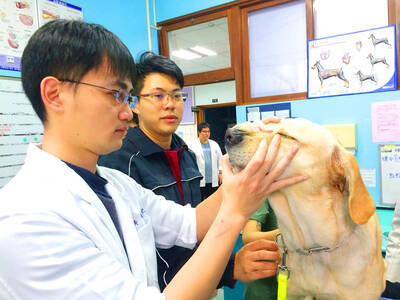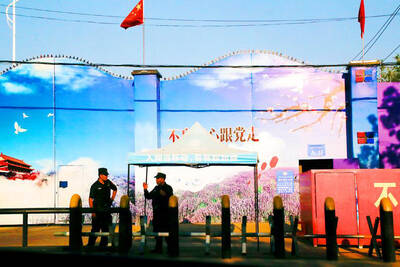Taiwan needs to devote sufficient resources to its defense, especially in cost-effective systems that leverage its strengths and can help deter China, a US official said at the US-Taiwan Defense Industry Conference in Ellicott City, Maryland, on Monday.
David Helvey, principal deputy assistant secretary of defense for Indo-Pacific Security Affairs, said in a speech that the goal is to create a “distributed, maneuverable and decentralized force,” which he described as “large numbers of small things.”
This force should be able to “operate in a degraded, electromagnetic environment and under a barrage of missile and air attacks,” Helvey said.
The systems best suited to Taiwan’s geography would be highly mobile coastal defense cruise missiles, short-range air defense, naval mines, small fast-attack craft, mobile artillery and advanced surveillance assets, he said.
Investing in these systems would be better, because they are more “cost-effective and survivable” compared with more conventional platforms, such as fighter aircraft or large naval vessels, he added.
“Taiwan cannot match the People’s Republic of China’s defense spending, but it does not have to,” Helvey said.
The US is working with Taiwan in pursuing these goals and preparing “additional requests for other capabilities” that might be more suited to deterring China, he said.
ARMS REQUEST
Among the weapons Taiwan has asked for are M109A6 Paladin self-propelled howitzers, a request that the Ministry of National Defense confirmed last month.
Helvey said that he would not comment on specific requests made by Taiwan, but added that Washington is collaborating with Taiwan on further defense engagements.
The US would continue to help Taiwan implement the Overall Defense Concept, as “much remains to be done” to ensure that Taiwan can field a credible force “proficient in asymmetric warfare, force preservation and littoral battle,” he said.
Harvey condemned Beijing’s attempts to “intimidate, isolate and coerce” Taiwan by bullying it diplomatically, applying economic pressure, holding increasingly provocative military exercises and meddling in its elections.
“As the Taiwan people prepare to head to the polls again in this coming January’s elections, it is crucial that Taiwan’s elections remain free and fair, without foreign interference,” he said.

Former Czech Republic-based Taiwanese researcher Cheng Yu-chin (鄭宇欽) has been sentenced to seven years in prison on espionage-related charges, China’s Ministry of State Security announced yesterday. China said Cheng was a spy for Taiwan who “masqueraded as a professor” and that he was previously an assistant to former Cabinet secretary-general Cho Jung-tai (卓榮泰). President-elect William Lai (賴清德) on Wednesday last week announced Cho would be his premier when Lai is inaugurated next month. Today is China’s “National Security Education Day.” The Chinese ministry yesterday released a video online showing arrests over the past 10 years of people alleged to be

THE HAWAII FACTOR: While a 1965 opinion said an attack on Hawaii would not trigger Article 5, the text of the treaty suggests the state is covered, the report says NATO could be drawn into a conflict in the Taiwan Strait if Chinese forces attacked the US mainland or Hawaii, a NATO Defense College report published on Monday says. The report, written by James Lee, an assistant research fellow at Academia Sinica’s Institute of European and American Studies, states that under certain conditions a Taiwan contingency could trigger Article 5 of NATO, under which an attack against any member of the alliance is considered an attack against all members, necessitating a response. Article 6 of the North Atlantic Treaty specifies that an armed attack in the territory of any member in Europe,

LIKE FAMILY: People now treat dogs and cats as family members. They receive the same medical treatments and tests as humans do, a veterinary association official said The number of pet dogs and cats in Taiwan has officially outnumbered the number of human newborns last year, data from the Ministry of Agriculture’s pet registration information system showed. As of last year, Taiwan had 94,544 registered pet dogs and 137,652 pet cats, the data showed. By contrast, 135,571 babies were born last year. Demand for medical care for pet animals has also risen. As of Feb. 29, there were 5,773 veterinarians in Taiwan, 3,993 of whom were for pet animals, statistics from the Animal and Plant Health Inspection Agency showed. In 2022, the nation had 3,077 pediatricians. As of last

XINJIANG: Officials are conducting a report into amending an existing law or to enact a special law to prohibit goods using forced labor Taiwan is mulling an amendment prohibiting the importation of goods using forced labor, similar to the Uyghur Forced Labor Prevention Act (UFLPA) passed by the US Congress in 2021 that imposed limits on goods produced using forced labor in China’s Xinjiang region. A government official who wished to remain anonymous said yesterday that as the US customs law explicitly prohibits the importation of goods made using forced labor, in 2021 it passed the specialized UFLPA to limit the importation of cotton and other goods from China’s Xinjiang Uyghur region. Taiwan does not have the legal basis to prohibit the importation of goods